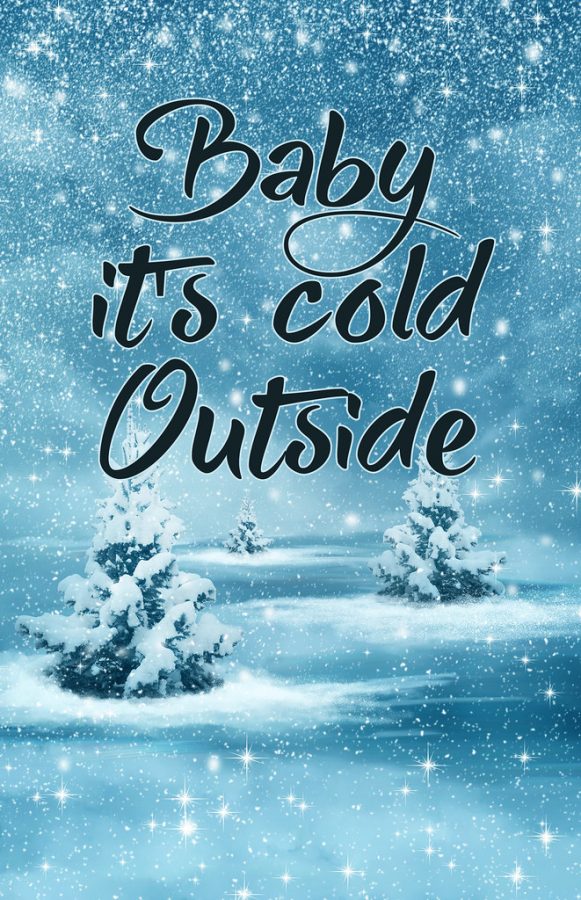“Baby It’s Cold Outside” fails the test of time
Poster of the 1940’s Christmas song, “Baby It’s Cold Outside.”
As the Christmas season continues on, songs celebrating the holiday are being played all over the radio, but one of these beloved songs is being criticized. The traditional Christmas song “Baby It’s Cold Outside” has been under scrutiny because of the lyrics hinting towards a forceful relationship between a man and a woman; this message leaves many people to wonder if the song should still be idolized and played over the radio during the holiday season. Those against the song believe that the behavior displayed within its lyrics is inappropriate, while the song’s proponents see it as a classic that should be cherished regardless of its controversial interpretation from today’s audience. The song has been proven to be about a man and woman making up an excuse to stay with each other, but that message has been lost, leaving audiences with lyrics that could easily be misread. Despite the song’s status and original intent, it should no longer be played over any form of media until the lyrics have been changed because of the unfortunate scenario today’s society thinks it portrays.
The story is told through the lyrics of a woman and a man’s conversation; the woman wants to go back home to her family and the man is trying to convince her to stay, often saying “baby it’s cold outside” as a reason for her to not leave. The woman resists the man’s pleas, saying things such as “I gotta go away” and “my mother will start to worry,” but the man persists in begging for her to stay. While the man has not done anything more than ask for the woman to stay at this point, he has disregarded her desire to leave and her denials, establishing how his desire is not mutual. The disregard for the woman’s requests is concerning because it creates a power imbalance between them, allowing for the audience to see the man as threatening.
While the beginning lyrics’ implication of disregarding denial is already a harmful message, later sections of the song insinuate a darker scenario that involves intoxication. After the woman tries to leave several times, each being met with another reason why she should not leave, the man convinces her to have another drink. The act appears harmless, the woman stating “well maybe just a half a drink more,” demonstrating her consent to stay and have a drink, but later turns sinister as she asks “say what’s in this drink,” hinting towards the drink having alcohol in it, unbeknownst to the woman. This implication is confirmed by the man stating directly after the question “no cabs to be had out there,” saying that she can no longer drive herself home because of her being under the influence. By compromising the woman’s state of mind, the man is not only making it harder for her to leave, but also impairing her decision-making abilities, making her more susceptible to his requests. At this point, the song leans into the theme of sexual assault, painting the act in a relatively cheerful light, which does not comply to the standards in today’s society about the power-dynamic that should exist between two people in a relationship.
The story progresses with the woman stating “I ought to say no, no, no sir” and “the answer is no,” illustrating her last efforts in resisting the requests to stay, but eventually she gives in to the man’s pleading and stays. However, this apparent “consent” to staying with the man is after she has an alcoholic drink, which would have the ability to weaken her judgement on the situation. Ultimately, the man had to intoxicate the woman and beg for her to stay in order to get his way, undermining the apparent “consent” seen in the song.
The song is seen as a classic, but when taking a closer look at the lyrics, it portrays a harmful relationship to its audience. The original message of two people trying to look for reasons to stay together has been forgotten, and without it, the song could easily be interpreted as a horror story. While it has been part of the Christmas tradition for over half a century, the song illustrates an inappropriate relationship that is not ideal for today’s standards and could prove to be a harmful message to people. For those reasons, “Baby It’s Cold Outside” should no longer be seen as a central song for the season without being changed to clarify the original intent of the song.

Sarah is a senior at Clover Hill High School and this is her first year working on the Chronicle. She has joined the Chronicle as a way to express her...







